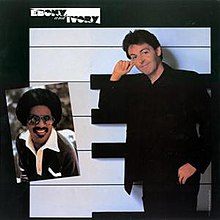Ebony and Ivory
| "Ebony and Ivory" | |||||||||||
|---|---|---|---|---|---|---|---|---|---|---|---|
 |
|||||||||||
| Single by Paul McCartney and Stevie Wonder | |||||||||||
| from the album Tug of War | |||||||||||
| B-side | "Rainclouds" | ||||||||||
| Released | March 29, 1982 | ||||||||||
| Format | 7", 12" | ||||||||||
| Recorded | 1981 | ||||||||||
| Genre | |||||||||||
| Length | 3:42 | ||||||||||
| Label |
Parlophone/EMI (UK) Columbia (US) |
||||||||||
| Writer(s) | Paul McCartney | ||||||||||
| Producer(s) | George Martin | ||||||||||
| Paul McCartney singles chronology | |||||||||||
|
|||||||||||
|
|||||||||||
"Ebony and Ivory" is a 1982 number-one single by Paul McCartney and Stevie Wonder. It was released on March 29 of that year. The song is featured on McCartney's album Tug of War. A self-empowerment hit that tackles issues of racial equality, the song reached number one on both the UK and the US charts. It reappears on McCartney's All the Best! hits compilation (1987), and also on the UK two-disc version of Wonder's The Definitive Collection greatest hits compilation (2002). In 2013, Billboard Magazine ranked the song as the 69th biggest hit of all-time on the Billboard Hot 100 charts.
At the simplest level, the song is about the ebony (black) and ivory (white) keys on a piano, but also deals with integration and racial harmony on a deeper, human level. The title was inspired by McCartney hearing Spike Milligan say "black notes, white notes, and you need to play the two to make harmony, folks!". The figure of speech is much older. It was popularised by James Aggrey in the 1920s, inspiring the title of the pan-African journal The Keys, but was in use from at least the 1840s.
Written by McCartney alone, the song was performed live in the studio by both McCartney and Wonder, though due to conflicting work schedules, both recorded their parts for the song's music video separately (as explained by McCartney in his commentary for The McCartney Years 3-DVD boxed set).
The b-side of the single, the song "Rainclouds", is written by Paul McCartney and Denny Laine, though on early pressings of the single the song was credited only to McCartney.
...
Wikipedia
